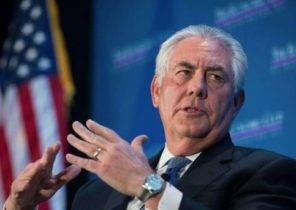
Politicians promise a lot. Some rely on the poor memory of the electorate and forget half of their promises. Other in the first days of his rule are bred extremely violent activities, then as long as possible not to bother with hassle of proper governance. And some of them succeed.
Adolf Hitler, for example. Shortly after the appointment of Hitler as Reich Chancellor on 30 January 1933 in his first address on radio, he said: “German people, give us four years and then judge us and take your sentence!”
This expression he apparently liked it, because two days later, he again used it in one of his rare interviews to foreign reporters: “Give us four years, the constitutional term of powers of the Reichstag, and then let the country judge us”. In the same interview he explained: “it is Impossible to immediately send the “ship” of the country on the right course. It takes time. Four years is all I require.”
This phrase became famous in its abbreviated form: “Give me four years and You will not recognize Germany!” Despite the fact that Hitler expressed his thought not in so many words, in this variant it was used the party propaganda, for example, on postcards and posters.
Exactly four years later, on 30 January 1937, Hitler took the podium to sum up the outcomes promised in the hall the restored buildings Kroll Opera, who served from 1933 year, the place of meetings of the meaningless Reichstag. At 13 o’clock he embarked on his three-hour speech: “Four years have passed since that moment began the great internal transformations which, since going through Germany.” He said, “Four years which I asked the German people as a period of trials and sentencing.”
Of course, the results were extremely positive: “For a few weeks the remains of the state and social prejudices of a thousand years ago in Germany, was destroyed.”
In particular, among other things, Hitler mentioned the revival of the economy, bringing order to the press and the culture that “today, guide and shape exclusively German compatriots”. He himself praised for the fact that terminated international agreements and at the same time abandoned the “German signature” in the Treaty of Versailles.
At the same time, he pointed to his smile: “the so-called surprises is now over, and in the future Germany “faithfully” and with a full consciousness of their “European challenges” will work on all the political problems of the world. The Reichstag, which consisted exclusively of the national socialists (and only male), of course, vehemently applauded — and then unanimously adopted the decision on the validity of the law of 1933 on the granting of powers to the government, that is, the deprivation of power himself for another four years, for a start — up to 1941.
But actually looked like the results after four years of the reign of the national socialists? The calculated average remuneration in Germany by the end of 1936 did not reach the level of 1931: their rate was 1783 REICHSMARK 141 brand or 7.3% less than five years earlier.
However, these relatively small numbers are misleading. Because, firstly, in the period between 1931 and 1936, consumer prices rose by about 15%; second, the majority of salaries (excluding salaries of new members of the party) remained on the same level. It is about the recovery medium in size and monetary rewards are primarily based on the fact that about three million unemployed were involved in employment programs Reich labor service and sent to military service since the resumption of conscription in 1935 and, in addition, they took a job in the rapidly expanding public sector.
The sector size is increased from 700 thousand people in early 1933 to 1.2 million at the beginning of 1938. This created almost without exception new senior positions mainly in various staff communication between the state and the party, which until 1933 was not necessary, and now they mostly find themselves in classes.
The number of proper labor relations in the economic sphere, by contrast, barely rose during the same period of time. The only exception is defense enterprises — the number of people employed in the German aviation industry has grown from 8357 workers in mid-1933 up to 160 000 at the beginning of 1937.
And in the construction sector people lose jobs, since the number of much needed new housing is rapidly declining: if in 1930 only in Berlin the renters were transferred to 43 854 apartments, their number in the 1933-1935 biennium was less than 10 000 flats a year, and in 1937, has grown only to 18 746 apartments — less than ten years before. The reason for this was the indifference of the state: if in 1928 for housing was spent 18.4% of public investment, the proportion of investment accounted for only 2%.
Because the available funds have flowed in mostly hidden, but nevertheless a huge defense complex. Already in 1934 its share in the state budget, which by that time was not calculated properly, was about 50%. Because money is effectively “created” by increasing the money supply, that is, in simple language, the course was put on the printing press, it came to additional inflationary pressures. So in November 1936, the Imperial government announced the freezing of prices — and resulted in a black market.
Not only in the economy the first four years in power the Hitler government can at best be called inconsistent. Much more it is, of course, the problems of civil rights: 1933 their almost non-existent. More than 100,000 Germans from that time were in concentration camps and were often subjected to ill-treatment. In late 1936 he is sitting in prison about 6000 political prisoners who were arrested without a court decision.
About 40,000 political opponents of national socialism fled Germany, mostly in 1933, in addition, for four years, fled fled, almost every fifth Jew — about 100,000 of the nearly half a million living in the country. Hitler’s policy of discrimination and exploitation in 1937/38 the years, it has become even more brutal.
The Germans gave Adolf Hitler four years. The result was awful, but ideological in the German media, it was not discussed, and among the population criticism was voiced only behind closed doors. However, after two and a half years he has plunged Europe into a new war. But the consequences were much worse.







